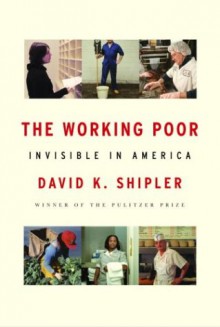“Most of the people I write about in this book do not have the luxury of rage. They are caught in exhausting struggles. Their wages do not lift them far enough from poverty to improve their lives, and their lives, in turn, hold them back. The term by which they are usually described, ‘working...
show more
“Most of the people I write about in this book do not have the luxury of rage. They are caught in exhausting struggles. Their wages do not lift them far enough from poverty to improve their lives, and their lives, in turn, hold them back. The term by which they are usually described, ‘working poor,’ should be an oxymoron. Nobody who works hard should be poor in America.” —from the Introduction From the author of the Pulitzer Prize–winning Arab and Jew, a new book that presents a searing, intimate portrait of working American families struggling against insurmountable odds to escape poverty. As David K. Shipler makes clear in this powerful, humane study, the invisible poor are engaged in the activity most respected in American ideology—hard, honest work. But their version of the American Dream is a nightmare: low-paying, dead-end jobs; the profound failure of government to improve upon decaying housing, health care, and education; the failure of families to break the patterns of child abuse and substance abuse. Shipler exposes the interlocking problems by taking us into the sorrowful, infuriating, courageous lives of the poor—white and black, Asian and Latino, citizens and immigrants. We encounter them every day, for they do jobs essential to the American economy. We meet drifting farmworkers in North Carolina, exploited garment workers in New Hampshire, illegal immigrants trapped in the steaming kitchens of Los Angeles restaurants, addicts who struggle into productive work from the cruel streets of the nation’s capital—each life another aspect of a confounding, far-reaching urgent national crisis. And unlike most works on poverty, this one delves into the calculations of some employers as well—their razor-thin profits, their anxieties about competition from abroad, their frustrations in finding qualified workers. This impassioned book not only dissects the problems, but makes pointed, informed recommendations for change. It is a book that stands to make a difference.
show less






 15 years ago
15 years ago